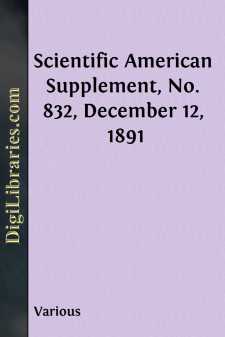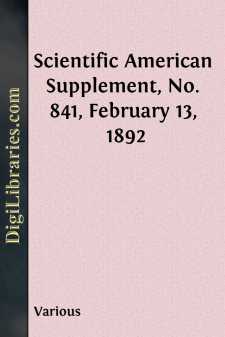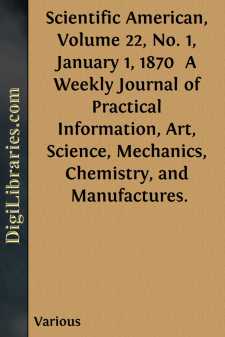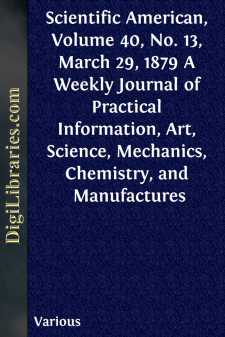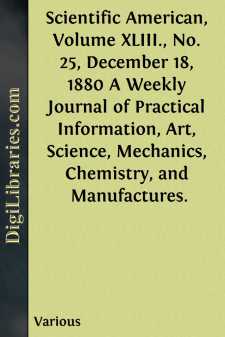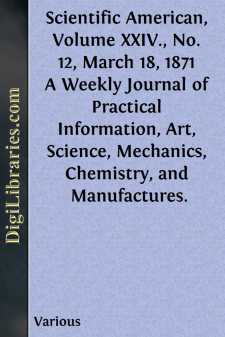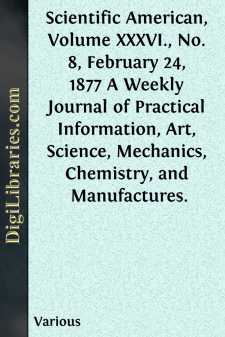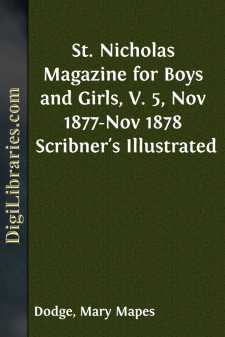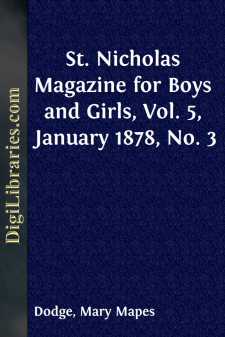Periodicals
- Art 27
- Children's periodicals 59
- Entertainment 5
- Food/Wine 2
- Games/Humor 455
- General 661
- Health 1
- History 53
- House/Home 1
- Regional 62
- Science/Nature 118
- Transportation 10
Periodicals Books
Sort by:
by:
Various
ARCHÆOLOGICAL DISCOVERIES AT CADIZ. Those who have had the good fortune to visit Andalusia, that privileged land of the sun, of light, songs, dances, beautiful girls, and bull fighters, preserve, among many other poetical and pleasing recollections, that of election to antique and smiling Cadiz—the "pearl of the ocean and the silver cup," as the Andalusians say in their harmonious and...
more...
by:
Various
Recently, a party consisting of engineers and employes of the Missouri River Improvement Commission began an exploration of one of the mounds, a work of a prehistoric race, situated on the bluff, which overlooks the Missouri River from an elevation of one hundred and fifty feet, located about six miles below Jefferson City. This mound is one of about twenty embraced in a circle one quarter of a mile in...
more...
by:
Various
Nitro-Glycerin. Professor Doremus of this city was called as a witness at the inquest upon the bodies of the unfortunate persons killed by the recent explosion at Bergen, N.J. The Professor having previously analyzed some of the explosive mixture, testified as follows:—"I have subjected it to chemical analysis, and find it to correspond to the formula C_{6}, H_{3}, O_{3}, and NO_{5}; it is well...
more...
by:
Various
SUGAR MAKING IN LOUISIANA. The New Orleans Times contains, in a late number, an account of the manufacture of sugar as conducted on the Poychas estate, from which we extract portions containing the essential particulars of cane sugar making as conducted in the southern portions of the United States. "Reaching the Cane shed, the crop, dumped into piles, is received by a crowd of feeders, who place...
more...
by:
Various
THE SCIENTIFIC AMERICAN SUPPLEMENT No. 169, For the Week ending March 29, 1879. Price 10 cents. For sale by all newsdealers. I. ENGINEERING AND MECHANICS.—The Herreshoff Torpedo Boat, recently built at Bristol, R. I., for the British Government. The novelties in the placing of the screw, etc. The Peculiar Boiler. 4 figures.—Improved Hopper Steam Dredger. 2 figures.—The St. Gothard Tunnel.—The...
more...
by:
Various
ONE MORE NUMBER. The next issue will close another volume of this paper, and with it several thousand subscriptions will expire. It being an inflexible rule of the publishers to stop sending the paper when the time is up for which subscriptions are prepaid, present subscribers will oblige us by remitting for a renewal without delay, and if they can induce one or more persons to join them in subscribing...
more...
by:
Various
There has recently been a most interesting discussion at the Literary and Philosophical Society, Manchester, on the above subject. The paper which gave rise to the discussion was by Mr. Brockbank, who detailed many experiments, and ended by stating his opinion that iron does become much weaker, both in its cast and wrought states, under the influence of low temperature; but Mr. Brockbank's paper...
more...
by:
Various
DATES AND THE DATE PALM. Even those whose knowledge of the customs of the Orient extends no further than a recollection of the contents of that time-honored story book, the "Arabian Nights," are doubtless aware that, since time immemorial, the date has been the chief food staple of the desert-dwellers of the East. The "handful of dates and gourd of water" form the typical meal and daily...
more...
by:
Mary Mapes Dodge
Kitty was a pretty little girl, with gray, laughing eyes, and a dimple in each cheek; but from the time when she first commenced to toddle alone she began to be dangerously fond of running away from home. Let a door be ajar ever so little and out pattered the tiny feet into the streets of the crowded city and all sorts of dangers. Papa and mamma had long consultations of what should be done to correct...
more...
by:
Mary Mapes Dodge
THE RAVENS AND THE ANGELS. (A Story of the Middle Ages.) By the Author of "Chronicles of the Schönberg-Cotta Family." I. In those old days, in that old city, they called the cathedral—and they thought it—the house of God. The cathedral was the Father's house for all, and therefore it was loved and honored, and enriched with lavish treasures of wealth and work, beyond any other...
more...


